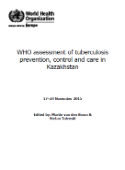WHO assessment of tuberculosis prevention, control and care in Kazakhstan (17–24 November 2015)

Download
The mission’s purpose was to assess implementation of recommendations made during WHO’s national tuberculosis (TB) programme review mission to Kazakhstan in 2012 and provide strategic and technical advice on the way forward.
The assessment team noted strong political support to the TB control programme from the Ministry of Health and Social Development. Continuous improvement in TB interventions and implementation of the Complex plan for tuberculosis control in Kazakhstan, 2014–2020 was evident, with advances in use of new molecular diagnostic tests, updated treatment protocols to international standards, increased availability of multidrug and extensively drug-resistant TB chemotherapy and reduction in hospital beds.
Despite good progress, some challenges and deficiencies remain. Areas for improvement include:
- ensuring management of childhood TB meets international standards;
- improving active case-finding and contact-tracing protocols;
- strengthening infection control;
- further rationalizing the TB network and institutions; ensuring more sustainable financing; and
- promoting greater advocacy by nongovernmental organizations and social mobilization.
This report presents key findings, challenges and recommendations for the national TB programme in Kazakhstan.



